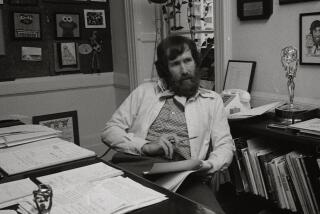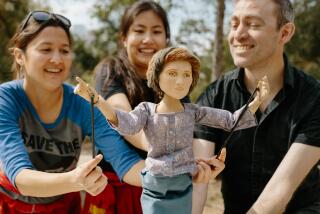Career Rich in Magic Paid $5,000 a Week in ‘20s : Life of Puppeteer Had Many Rewards
PHILADELPHIA — Felix Smyth once had the world on a string. Fancy cars, opening nights at the theater, a bin full of coal, a cupboard full of food.
“In general, we were better off than anyone else,” Smyth said. “We lived pretty well.”
Sometimes, too well.
Smyth’s life style often got him into trouble with the law.
“The police would take me in and grill me about robberies in the neighborhood,” he said. “They couldn’t understand how I could live so well. They thought I didn’t have a job.”
They thought wrong. He did have a job--giving life to a hunk of wood, a hank of cloth, a spool of thread.
Smyth was a puppeteer, a man who pulled the strings that brought magic and laughter to millions of “children from 6 to 96.”
He pulled down decent dough too.
Like the summer of ’28 when Smyth, while still attending North Catholic High School, took in $5,000 a week working up and down the East Coast.
In the evenings, he did three shows for vaudeville audiences.
Then, starting at midnight, he put on two after-hours shows for guys with a wad in their pockets and a bulge in their coats.
“I didn’t know it at the time, but I was working in speak-easies,” Smyth said with a laugh.
Now the veteran puppeteer, who will be 76 in October, gets around his row house with the help of a large shillelagh. He has no control over his lower legs. No feeling in his feet. He is practically blind. He hasn’t pulled a string in earnest in more than two years.
“He’s on the shady side of his career, but at one time he was at the top of his profession,” said Gerald Whartenby, a retired city detective and puppeteer who has performed with Smyth.
“He’s one of the last vaudeville-era puppeteers still around,” added Whartenby. “He’s a Philadelphia treasure, but no one knows it. He’s a tremendous puppeteer.”
Smyth started fooling around with puppets as a youngster growing up in north Philadelphia. He happened to hear a puppet show on the radio and started imitating the various voices and sounds heard on the show.
The next Christmas, the 6-year-old boy received a set of hand puppets from his mother--not Santa Claus.
“I came from a very realistic family,” he said. “I was not allowed to believe in the fantasy of Santa. I had the joy of Christmas, but not the fantasy of it. My fantasy would come later.”
A wood back-alley fence was Smyth’s stage. Soon he started making his own puppets. In addition to hand puppets, young Smyth also carved marionettes (stringed puppets).
Smyth turned professional when he was 10. He remembers it was on a Sunday because he was supposed to go on a picnic, but was asked to perform at a church fair. It was an offer he couldn’t refuse.
“They paid me a man’s weekly salary, which back then was $10, $12,” he recalled. “Here I was a kid 10 years old, making in one day what a man made in a week. From then on, I averaged $10 a show.”
Though the coal bin, pantry and his pockets were full, Smyth--wanting to “keep the cops off my back”--got a plant job in 1932. It was supposed to be only temporary. He retired 42 years later.
After retirement, Smyth continued his puppetry, putting on more shows than ever. Despite getting up in years, he seemed as ageless as his handcrafted marionettes.
But in the winter of 1982, time started to close in.
Smyth, who has two children and two grandchildren, was into the third week of a seven-month tour of the Midwest when his auto skidded off an ice-covered highway near Grand Rapids, Mich. At first, it appeared that he wasn’t seriously injured, but it was later determined he had suffered two broken vertebrae.
Four years and two operations later, Smyth was left with no control of his lower legs and without feeling below his ankles. About the same time, glaucoma left him blind in one eye and almost blind in the other.
Very seldom does Smyth open the small, drab, well-traveled suitcase containing his puppets.
“I don’t want to torture myself reminiscing, either,” he said. “Over the years, I put on thousands of shows for millions of people. I wish I could do it again, but I know I can’t. I miss it, the travel, the excitement of the audience, the closeness of the kids.”
More to Read
The biggest entertainment stories
Get our big stories about Hollywood, film, television, music, arts, culture and more right in your inbox as soon as they publish.
You may occasionally receive promotional content from the Los Angeles Times.










